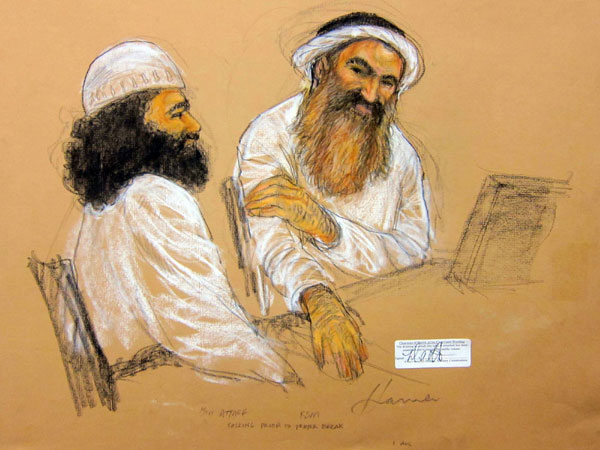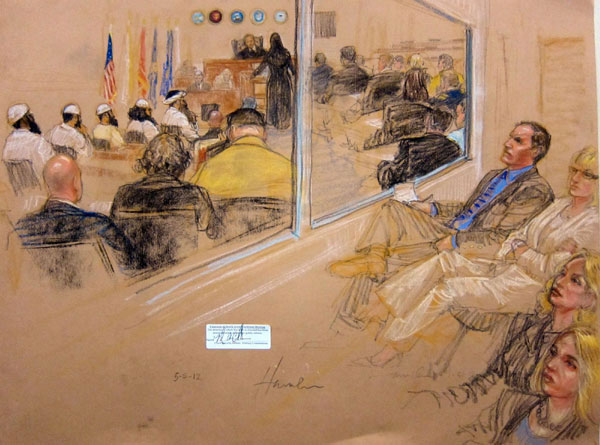
GUANTANAMO BAY US NAVAL BASE, Cuba - Five Guantanamo prisoners accused of plotting the September 11 attacks defiantly refused to answer a US military judge's questions on Saturday in a chaotic court hearing where they deferred entering pleas.
Star defendant Khalid Sheikh Mohammed, the confessed architect of the hijacked plane attacks, and his four co-defendants exercised their right to delay entering any plea to murder and terrorism charges that carry the death penalty.
|
 |
|
Walid Bin Attash, (L) and Khalik Sheikh Mohammad, appear at their arraignment in this courtroom sketch reviewed and approved for release by a US military security official, at Guantanamo Bay Navy Base, Cuba, May 5, 2012. [Photo/Agencies] |
|
 |
|
Mustafa al Hawsawi, Ammar al Baluchi, Ramzi bin al Shibh, Walid Bin Attash, and Khalik Sheikh Mohammad (L-R), at their arraignment in this courtroom sketch reviewed and approved for release by a US military security official, at Guantanamo Bay Navy Base, Cuba, May 5, 2012. Victim family members Tara Henwood-Butzbaugh and sister Mary Henwood-Klotz, (R), who lost brother John C. Henwood, observe from gallery. [Photo/Agencies] |
One of Mohammed's co-defendants insisted that the 87-page charge sheet be read in court and the judge agreed, saying the reading would begin late Saturday evening after the hearing had already dragged on for more than nine hours.
The charge sheet lists the names of all 2,976 people killed when the hijacked planes slammed into the twin towers of the World Trade Center in New York, the Pentagon and a Pennsylvania field in 2001, and would presumably take hours to read out.
The judge had struggled to keep the proceedings in the death penalty case on track throughout much of the day, as Mohammed and his co-defendants refused to answer his questions.
"Why is this so hard?" asked the exasperated judge, Army Colonel James Pohl.
Mohammed, a 47-year-old Pakistani, looked haggard and his full, scraggly beard had a reddish tinge. He wore a round white turban and white tunic.
The military tribunal hearing, in the top-security courtroom at the Guantanamo Bay US naval base in Cuba, marked the first time the notorious detainees had been seen in public in about three years.
The Islamist militants are accused of conspiring with Osama bin Laden, murder in violation of the laws of war, hijacking, terrorism and other charges stemming from the 2001 attacks that propelled the United States into a deadly, costly and ongoing global war against al Qaida and its supporters.
A previous attempt to prosecute them in the Guantanamo war crimes tribunal was halted when the Obama administration tried unsuccessfully to move the case into a New York federal court.
Praying in court
Yemeni defendant Ramzi Binalshibh knelt on the courtroom floor and prayed as a row of burly guards in camouflage uniforms kept a close watch but did not interfere.
Later he stood and shouted, and seemed to be saying that the late Libyan leader Muammar Gadhafi was being held at Guantanamo. He said tricks were being played on the defendants inside the prison camp and that "maybe they are going to kill us at the camp ... and say that we are committing suicide".
Yemeni defendant Walid bin Attash refused to come into the court and was strapped into a restraining chair and wheeled in by the guards. His prosthetic leg was brought in later. It replaces the right leg he lost during a 1997 battle in Afghanistan. The judge later freed him from the chair after he promised to behave inside the courtroom.
The defendants prayed and chatted among themselves during recesses, and passed around a copy of The Economist magazine. But they refused to answer the judge's questions. He ruled that they would be represented by the lawyers assigned to them. In addition to their military lawyers, each has a civilian attorney with experience in death penalty cases.
Torture issue
Later in the day, the proceedings got bogged down in repeated questions put to the judge. Lawyers for all five defendants quizzed Pohl extensively about his reading habits, judicial experience and his views on "Enhanced Interrogation Techniques" that they view as torture.
"I'll address the EIT issue when it comes up," the judge said.
All the defendants were held for more than three years in secret CIA prisons before being sent to Guantanamo in 2006, and all have said they were tortured there. The CIA said Mohammed alone was subjected 183 times to the simulated drowning technique known as waterboarding.
A small group of people whose relatives died in the attacks were chosen by lottery to travel to the Caribbean base to watch the hearing from behind a glass wall in the spectators' gallery.
Cliff Russell, whose firefighter brother Stephen Russell, 40, was killed at the World Trade Center, said he was comfortable with the death penalty for the defendants and wished them "the worst death possible".
"I think I have all the evidence I need," said Russell, who helped recover the remains of 23 people from the ashes and rubble of the Trade Center. "I tasted death, literally."
He said the taste lingered in his throat and that he hoped that the trial "would be the process that gets rid of that for me".